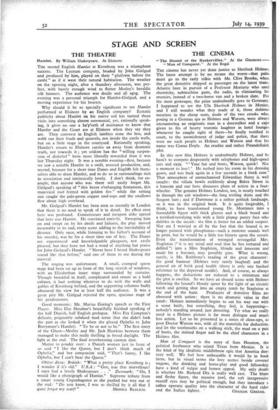STAGE AND SCREEN
THE THEATRE
Hamlet. By William Shakespeare. At Elsinore.
THE second English Hamlet at Kronborg was a triumphant success. The Lyceum company, headed by John Gielgud and produced by him, played on their " platform before the castle " as if it were their natural habitation. The weather on the opening night, after a thundery afternoon, was per- fect, with barely enough wind to flutter Motley's heraldic silk banners. The audience was docile and all agog. The evening was a personal triumph for Hamlet-Gielgud, and a moving experience for his hearers.
Why should it be so specially significant to see Hamlet performed at Elsinore by an English company? Ecstatic publicity about Hamlet on his native soil has turned these visits into something almost ceremonial, yet, rationally speak- ing, it gives no one a ha'p'orth of assistance to know that Hamlet and the Court are at Elsinore when they say they are. They converse in English iambics none the less, and wdrk out their feuds and quarrels, not inside the castle walls, but on a little stage in the courtyard. Rationally speaking, Hamlet's return to Elsinore carries us away from dramatic truth, not towards it ; yet seldom has the " willing suspen- sion of disbelief " been more liberally rewarded than it was last Thursday night. It was a notable evening—first, because we saw a notable Hamlet in a swift, assured production, and, second, because for a short time Danes and Englilh felt them- selves able to share Hamlet, and to do so in surroundings rich in association and intrinsically lovely. I don't think, for ex- ample, that anyone who was there will easily forget Mr. Gielgud's speaking of " this brave o'erhanging firmament, this majestical roof fretted with golden fire " while the setting sun caught the pale-green copper roof-tops and the swallows flew about high overhead.
Mr. Gielgud's Hamlet has been seen so recently in London that there is no need to speak of it in detail. Its effect over here was profound. Connoisseurs and inexpert alike agreed that here was Hamlet. He convinced entirely. Sweeping him on and swept on by his deeds and failures, the play moved inexorably to its end, every scene adding to the inevitability of disaster. Only once, while listening to his father's account of his murder, was he for a short time out of key. The Danes are experienced and knowledgeable playgoers, not easily pleased, but they have not had a word of anything but praise for John Gielgud's Hamlet. " Never have I heard Shakespeare sound like that before," said one of them to me during the interval.
The staging was unfortunate. A small, cramped apron stage had been set up in front of the long stretch of windows, with an Elizabethan inner stage surrounded by curtains. Though beautiful in itself, complicated and ornate as a buhi cabinet, it had nothing whatever to do with the walls and gables of Kronborg behind, and the supporting columns badly obscured the view for at least half the audience. It was a great pity Mr. Gielgud rejected the open, spacious stage of his predecessors.
Good moments : Mr. Marius Goring's speech as the First Player. Miss Else Skouboe's beautifully finished speaking of the half Danish, half English prologue. Miss Fay Compton's delicate, poignantly subdued mad scene (but she didn't look the part as she looked it when she played Ophelia to John Barrymore's Hamlet). " To be or not to be." The first entry of the Ghost—Motley and Mr. Jack Hawkins between them managed to make this really thrilling in broad daylight. The fight at the end. The final reverberating cannon shot.
Matter to ponder over: a Danish woman just in front of us said " I like the Queen, but I don't think much of Ophelia," and her companion said, " That's funny, I like Ophelia, but I can't bear the Queen."
Obiter dicta: British: "What a pretty place Kronborg is ; I wonder if it's old." U.S.A.: " Gee, was that marvellous! I once had a lovely Shakespeare . . ." Denmark: " 0o, I would like a photograph of Hamlet." Supreme tribute from a smart young Copenhagener as she pushed her way out at . the end : "Do you know, I was so thrilled by it all that I










































 Previous page
Previous page